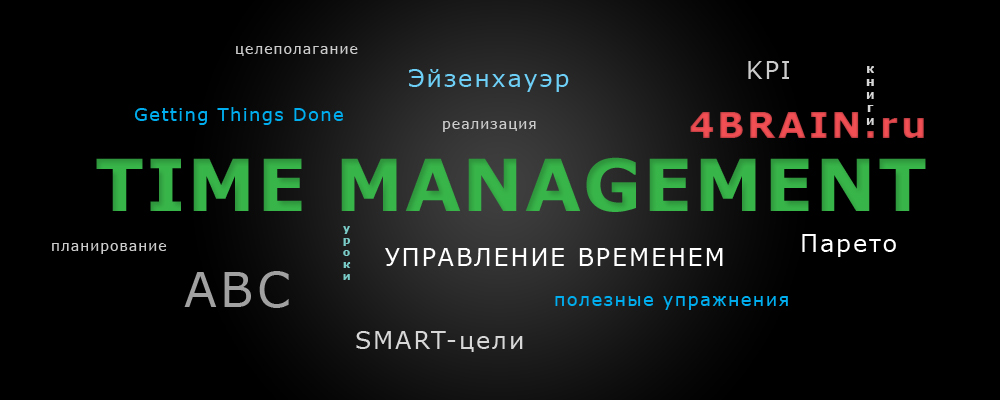Don't say you don't have time. You have exactly the same amount of time as Michelangelo, Leonardo da Vinci, Thomas Jefferson, Pasteur, Helen Keller, Albert Einstein had.
Jackson Brown
Good day, readers of our site. Very often I hear such a phrase “What a pity that there are only 24 hours in a day, there is always not enough.” So one day I thought about why some do not do much work and they constantly do not have enough time, and someone is able to fulfill huge orders, yes and a lot of time to leave for other needs. If it works for some, it can work for you too. But how to do that? How to properly allocate your time?
Not so long ago, the term Time Management appeared, which, translated into Russian, means time management. More than one book has been published, dozens of articles and all kinds of publications have been written, there are many videos from conferences, lectures and reports on the network that teach you how to manage your time. Today I decided to write an article on this issue, and the choice was not accidental. Until recently, I also sinned that I didn’t get enough sleep, I didn’t have enough time for everything, I constantly didn’t have time for something, and this made me a little angry. But then a book about time management fell into my hands and the mistakes were obvious. Every day I stole from myself for 5-7 minutes different ways, so an hour accumulated, then two, three and more. As a result, I wasted half a day without even noticing it myself. I am sure that many of you are also wasting time, but do not even suspect that it is going nowhere.
Let's analyze together how not to waste precious minutes, how to build a day in such a way as to most effectively complete all the tasks set for ourselves.
Between success and failure lies an abyss called "I don't have time"
Franklin Field
Rule #1 - Plan your tomorrow.
It is very difficult to manage time if you do not know what you need it for. The main loss of time happens due to the lack of a plan of action. We take on one task, then jump to another, get distracted and start doing the third. Thus, we have three started works and none of them are finished. No results, time wasted.
Try to logically plan your day. What needs to be done and why, how to do it, whom to call and whom to meet. Also develop the habit of obligatory implementation of the plan, do not transfer anything to tomorrow.
| We recommend reading: |

Rule #2 - Mornings are wiser than evenings.
Try to plan most of the work in the first half of the day. In my article “Habits that can change your life,” I wrote about the importance of waking up early rather than lying in bed before dinner. I noticed that those who get up early are more productive, think clearly, and can use their time rationally.
Rule #3 - Realism
Do not include in your plan what you obviously cannot do, or what is beyond your control. Try to be as realistic as possible in assessing your chances of doing this or that work and only then include it in the plan for tomorrow.
Rule #4 - Don't do it all in one sitting
If you have a big task ahead of you (write a couple of dozen texts, analyze an Internet project, optimize a website, study customer behavior, etc.), then try to distribute it into several small subtasks, each of which must be completed in a certain order. So you will see the result, subconsciously stimulate yourself. After completing one small task, move on to another, and so on in order.
| We recommend reading:
|

Rule #5 - Peace and privacy
If you have a serious task in front of you that will require concentration, then it is better to retire, sit in a quiet and calm place and slowly complete the task. I know a copywriter who writes without problems in any situation (in the subway, in parks, on the street, in cafes and bars), but if the task is serious and responsible, then he tries to retire and immerse himself in thoughts. This allows you to work as efficiently as possible, increase efficiency and speed of execution.
Conclusion - work in a comfortable environment for you.
An ordinary person thinks how to spend time. Clever man thinking about how to use the time.
Rule #6 - Order First
Very often we spend time looking for something that was not there. Clutter leads to wasted time. In the home, office and even on the laptop desktop, everything should be clearly ordered. After you use some thing, put it in its place so that next time you don’t waste time looking for it.
Also try to structure all documentation, books, tools, etc. Have you ever seen a toolbox? Here everything lies in a certain cell and there is a place for everything. So it should be in your life - everything has its place.
Time Management: Rule #7 - Set Deadlines
Timing is a very important aspect of time planning. You can set a task for yourself, but you can’t determine how much it really needs to be done. That is the problem. Tasks that can be done in an hour are stretched out for a whole day.
 Time management for modern man — central concept any system of personal efficiency and productivity, the Holy Grail for every ambitious individual, whether student, entrepreneur or housewife. The fast pace of life, especially in major cities, and huge amounts of data make it difficult to achieve goals that are important for each of us, whether it is a promotion, raising a child, or creating our own entrepreneurial project. If you have something to strive for, you are unhappy with your results, you just want to become a little more effective, or you need help overcoming procrastination (the habit of putting things off until later), then this series of lessons is created just for you.
Time management for modern man — central concept any system of personal efficiency and productivity, the Holy Grail for every ambitious individual, whether student, entrepreneur or housewife. The fast pace of life, especially in major cities, and huge amounts of data make it difficult to achieve goals that are important for each of us, whether it is a promotion, raising a child, or creating our own entrepreneurial project. If you have something to strive for, you are unhappy with your results, you just want to become a little more effective, or you need help overcoming procrastination (the habit of putting things off until later), then this series of lessons is created just for you.
The presented online training will acquaint you with the basics of time management and its details, talk about how you manage your time and organize your life the most successful people planets. Completely free of charge, your attention will be offered various principles, methods, exercises, techniques and techniques that make up the most effective time management systems, and which will allow you, by putting them into practice, to notice positive changes in the very first days. This online time management course will become your personal guide to a world where you will forget about eternal fatigue, constant stress and lack of time. You will learn how to correctly set goals and plan to achieve them, have time to do great amount cases in record short time to enjoy work and find time to relax. The course contains tips and methods for managing time that are truly effective.
However, despite the fact that the presented course has great potential, time management itself, unfortunately, is fraught with unexpectedly many uncertainties and questions. First, why different approaches to time management so much? What is the difference between David Allen's GTD method and Gleb Arkhangelsky's time drive method? Why does every next “super-efficient” author invent something new, is there really nothing definite and accurate in time management?
Secondly, why does not everything proposed by specialists work? The authors unanimously speak about the effectiveness of their methods and techniques, but I don’t want to follow them at all. And then, even if you do everything exactly according to the instructions, something still goes wrong. What is the reason?
And thirdly, what to do with the unwillingness to live on the machine according to a once, but forever routine? How to adjust a clear system of organizing time to the constant changes that our life is so rich in?
This series of online tutorials is not designed to answer all of the questions above, but is designed to help you answer them for yourself. And this is its most important value. And for the same reason, having studied the materials of this training, you can not only “pump” some of your individual qualities, but also have a complex impact on your personality.
Time management (organization of time, time management) is a time-ordering technology aimed at increasing the efficiency of its use.
The very concept of "time management" comes from the English "time management" and means the technology of organizing a person's time and increasing the efficiency of its use. More specifically, time management implies an action or a set of actions to train conscious control over the amount of time spent on certain activities and through which you can significantly increase your productivity and effectiveness.
Time management includes a wide range of activities, including:
- Goal setting
- Planning and time management
- Task delegation and resource management
- Time analysis
- Time stamp
- Prioritization
- Listing
- And many others

At the beginning of its appearance, time management concerned only the sphere of labor activity or business. But, as it developed, the term began to expand and included various aspects of a person's personal activity. Today, time management is a necessary component of the development of absolutely any project. serves as a determining factor in calculating its scope and time required for its implementation.
In Russia, for the first time, a revolutionary and public figure A. K. Gastev, who in the 20s of the XX century was the director of the Central Institute of Labor. He began to develop ideas about the personal effectiveness of a person and about efficient use time. Already in the early 70s, the first method appeared that allowed you to manage personal time, called "Timekeeping". Over time, the topic began to rapidly gain more and more supporters and be introduced into various areas of people's activities. All this led to the fact that time management became an independent direction, and in 2007, the department of time management was created at the Moscow Financial and Industrial Academy (today - the university).
Time management has its own structure, consisting of several important processes:
- Analysis
- Development and formulation of strategies
- Planning and prioritization
- Process Implementation
- Goal achievement control
It is important to note that time resource management allows you to effectively manage not only working time, which is the main part of the life of an ordinary person, but also free time that a person uses for recreation. By applying it to Everyday life, you can organize your life much more efficiently, plan a weekend, arrange various events. Skillfully managing his time, a person can even make a mini-vacation out of his weekends. Together, this has a very positive effect on the emotional, mental and physical health of a person and significantly improves his life.
To date, special schools for teaching effective time management have been created and are successfully operating. Standard training takes place on the following main topics:
- Strategic planning
- tactical planning
- Evaluation of personal effectiveness
- Assessment of managerial effectiveness
- Defining personal mission as an emotionally motivating factor
- Determining the main factors for developing your own plan
- Ability to prioritize
- Mind Mapping Tool
- Training in the basics of using software designed specifically for planning (MyLifeOrganized, MS Project, MS Outlook and other programs)
- Analysis of what has been achieved
- Studying methods for improving the process of achieving goals
To teach people the basics of competent time management, various trainings and seminars are being held today, programs and courses are being developed, books and other publications are being published, and various Internet resources and online trainings are being created, such as the training presented on our 4brain website, for example.
Application of time management
IN modern world personal time is a key human resource, often having a much higher value than money, since, unlike money, it cannot be accumulated or restored. That is why the ability to make the best use of your time and manage it is of essential value for any person. And it is important to learn how to apply this skill in all areas of life: work, business, creativity, family relationships etc.
The skill of time management provides a person with a huge number of different benefits. Below we list just a few of them.
So, a person who knows how to manage his time:
- Achieve goals more often than others
- Achieves his goals many times faster than people who do not have such a skill
- Able to achieve success in any field of activity
- Has much more time to relax, be with loved ones and do things you love
- Able to perform many different tasks in a short period of time
- Has the ability to increase his income, build capital and retire as soon as possible
- Can get rid of the feeling of constant fatigue and improve your health
- Much less affected by stress and negative factors
- Positively perceives the world and the events that take place
- May spend more time on spiritual development and self-improvement
- Always has a clear plan of action
- Has inner freedom and has the ability to choose
- Able to create favorable conditions and independently control their lives
This is only part of the positive impact that the ability to manage time has on a person's life. It is not just that there is an opinion that people who do not know how to allocate their time cannot find a single free minute, and are constantly busy with something, but all their employment does not bring any sensible results. And people who are able to skillfully manage their time resource can always set aside time for something or for someone, and all their affairs continuously move them towards their goals and achievement of success.
If you get acquainted with the features of the life and work of successful people, you will certainly find that all of them, as one, say that the most valuable asset that a person has is his time, and you will probably notice that they all keep diaries, make up plans, think over further steps and do it all the time. They are always full of ideas, and the amount of their cases is simply amazing. But, at the same time, they are happy, smiling, positively disposed; everything they do, they do it with enthusiasm and enjoy it; and also have good health. If you are a person who strives for self-development and personal growth, then it is likely that you would like to achieve similar results, otherwise you would not be here. And there is great news for you - YOU CAN DO IT. You just need to set yourself a goal - to learn how to use your time efficiently.
How to learn it?
It's no secret that we are all born with a set of different abilities and predispositions. But, of course, these abilities and predispositions are different for everyone, and while some people are initially inclined to effectively manage the time of their lives, others have to develop and hone this skill. Whatever the case, it can be done. And again, good news - YOU CAN DO THIS INDEPENDENTLY, i.e. without resorting to being trained in specialized institutions or buying expensive training courses. Moreover, it is not at all necessary to have some special talent or genius, but you can simply go through an online training, the introduction to which you are now reading.
There are two important points in taking this course. This:
Theoretical base- the information that you can get from the lessons we offer.
Practical development- applying what you learn in practice - in your daily life.
Based precisely on these important points We have developed this training. Each lesson is designed so that you can learn the theoretical material, which is presented in an interesting and completely understandable and accessible language for any person. And also to ensure that you have the motivation and the opportunity to apply everything that you have learned, not waiting for some opportune moment, but right here and now. All you need is the desire to learn a new skill and some free time, which you will need to find for this, which we, of course, have no doubt about.
Do you want to test your knowledge?
If you want to test your theoretical knowledge on the topic of the course and understand how it suits you, you can take our test. Only 1 option can be correct for each question. After you select one of the options, the system automatically moves on to the next question.
Time management lessons
Having studied the experience of teaching time management to many people, we came to the conclusion that, as we have already said, you can learn its basics on your own. Having introduced some adjustments and even more adapted the material for self-study, we have prepared a series of lessons aimed at developing useful competencies for the full mastery of this skill. Below is a short description of each lesson:
The purpose of this lesson is to help you understand the features and nuances of time management as much as possible, as well as to understand and feel at a deep level how effective organization of your time can contribute to the achievement of goals, help develop the potential of your personality and have a beneficial effect on life in general.
The lesson will consider such issues as the goals of time management and its prerequisites, the main stages and features of this process. In addition, you will learn a lot of tips for improving personal efficiency and will be able to choose those that will suit you.
As you know, any human action is directly related to the fact that he spends a certain amount of time to complete it. And if the information from the first lesson will teach you to determine and fix your time costs and understand the structure of the distribution of a temporary resource, then the knowledge that you will receive from here will help you learn to separate what you need to spend your time on from what you do not need. .
Here we will talk about the goal-setting process: you will learn to determine your true goals and secondary tasks, which means you will be able to do what will allow you to eliminate wasting time, and even your minimal efforts will bring you maximum results.
Achieving any result is a process that always has its own characteristics and characteristics. It is important to understand that not all actions are effective. You need to be able to see prospects, calculate your steps and set priorities. Having a goal also means having a plan to achieve it. This and others interesting questions and this lesson is dedicated.
From it you will learn about what is the process of planning cases, what are the methods of prioritization, get acquainted with the most effective techniques for making plans and lists. In addition, you will learn some important principles that will help you learn how to save time, improve your results, and avoid many of the mistakes that are common to people who have embarked on the path of good time management.
Despite the fact that the concept of “time management” came into the Russian language not so long ago, many have paid and are paying attention to the very fact of organizing personal time in order to achieve goals and increase productivity. eminent figures. Perhaps that is why they were able to achieve significant success, because the ability to manage the main resource - time - often depends on a person's ability to cope with all matters, work hard and efficiently in any situations, and emerge victorious from them.
One way or another, everyone planned their employment (artists, writers, politicians - well-known and not so), but B. Franklin became the creator of not a universal daily routine, but one of the first integrated time management systems. He is at own example showed how important it is to set goals and develop a plan to achieve them. About his and other author's time management systems, which combine the principles of goal setting, planning and motivation, and will be discussed in this lesson.
A. Herzen wrote: "Theory inspires conviction, an example determines the course of action." In fact, time management systems lesson 4, the basics of goal setting lesson 2 and planning lesson 3 as the main components of time management would be no more than elements of a coherent theory if they were not supplemented by specially developed general methodological and practical tools within individual techniques. Following them, applying them in their daily life, everyone will be able to acquire not only useful knowledge but also to create our own system for setting, evaluating and implementing strategic goals.
The recommendations, tips, tricks, techniques, as well as time management services and programs collected in this lesson are taken from various sources, but are universal tools and are equally useful both in terms of time management and personal development in general: self-discipline training , character, attitude to life priorities and goals.
Lesson authors: Sergey Krutko, Kirill Nogales and Artyom Zakharov.
How to take classes?
All our lessons have one important feature - they are designed in such a way that absolutely anyone can apply them. But you must certainly keep in mind that how successfully you master the material depends, to a large extent, on your attitude. If you treat it negligently, from the position “if there is time, then of course I will do it,” then the result will be completely mediocre, if any at all. But in the event that you approach the study of the material with all responsibility and understanding the importance of what you are doing, then the result will be your rapid personal growth and an increase in the performance of all personal characteristics, not to mention the fact that you will learn to manage your time perfectly.
In order to get the most out of the training, we recommend that you study one lesson every two days: on the first day you just need to familiarize yourself with the lesson, and on the second day you will use what you have learned throughout the day, each time using new techniques. and combining them. In total, the entire course will take you about ten days. But it is also important here that, having taken up the training, in no case should you miss classes. Set yourself the task of completing this course to the end. This alone will already become your practice of time management, and in addition, it will begin to develop in you such qualities as purposefulness, commitment, diligence and punctuality. Remember that theory and practice are two sides of the same coin. Only in this way can you learn what you want, and only in this way have all successful people done at all times. And one more thing: prepare a notebook and a pen in advance, because in the matter of planning you can’t do without it.
Additional material
Time Management Books
In this supplementary section, we'll take a look at some of the most popular books on the topic of time management. Each one is a unique collection. useful information, practical advice and instructions, effective techniques and techniques for time management. Some of them are written by professional authors and have already earned their reputation not only among Russian readers, but also among readers from all over the world. Others have been published quite recently, and their authors are not yet so famous, but undoubtedly deserving attention people. Any of the books reviewed will be a great addition to our training.
- Time drive. How to manage to live and work. G. Arkhangelsky
- Tough time management: take control of your life. D. Kennedy". We invite you to read the articles:
Quotes of great people on the topic of time
On the topic of the importance of time, among other things, great people often spoke. As an additional motivation, we suggest that you familiarize yourself with several such sayings below.
“Time flies is bad news. Good news You are the pilot of your time - Michael Altshuler
"Don't waste time, invest in it" - Stephen Covey
“You can never 'find' time for something. If you need time, take it" - Charles Braxton
“One should look at a day as a small life” - Maksim Gorky
“What I have observed is that most people are promoting at exactly the time that other people are simply wasting” - Henry Ford
"Time is the stuff of which life is made" - Benjamin Franklin
"Killing time looking at the clock - what could be more stupid?" - Haruki Murakami
"Modern man does not know what to do with the time and forces that he has released from his hands" - Pierre Chardin
"Woe to those peoples who obey the times instead of commanding them!" - Carl Burne
“Time wasted is existence; Time used to good use is life." - Edward Jung
We wish you success in mastering the skill of time management!
Today it is very fashionable to engage in self-development, attend lectures, coaching. A lot of attention is paid to time management. This is the art of managing your time wisely and doing everything you need to do. Which of the magical items will be required for this, where to get it and how to work with it - you will learn from this article.
The art of managing your time
Modern life has a frantic pace. To live fully, you need to learn how to correctly allocate your time. Probably everyone is familiar with the situation when things accumulate like a snowball, and there is sorely not enough time for anything. This state of affairs in 90% of cases does not depend on the real number of cases, but on laziness and procrastination. This can be characterized by the phrase "loitering from corner to corner."
Controlling your time means focusing on what matters most. Stop doing things that bring neither money nor satisfaction. This includes things called procrastination:
- watching TV programs;
- reading news in in social networks, often this is an empty scrolling of the tape;
- telephone conversations;
- interactive, etc.
There is a wonderful book by Bodo Schaefer, The Art of Managing Your Time. It details exactly how you can prioritize goals and devote enough time to all the important areas of your life:
- health;
- Job;
- emotions;
- finance;
- spirituality.
By the way, the material is also available in audio book format to combine the useful with something pleasant. For example, you can lie in a bath with a mask and listen to how to change your life for the better. All in all, a recommended read.
How to do everything

Important tips for effective planning of your life:
- Stop taking everything on yourself. Yes, of course, the realization that the work is done only by your efforts is wonderful. But is every job worth it? involve household members in solving everyday problems.
- gifts information technologies. Check the traffic situation before leaving home. If you find difficulties along the way, rebuild the route with a minimum of time. Do not waste precious hours standing in lines, pay for everything that is possible online.
- It is very important to strictly follow the plan and not stray into disciplinary violations. For example, everyone's favorite “10 minutes and I get up” is not useful. The body will not have time to sleep during this time, but it is quite possible to have time to wash and do some household chores during this time. But abruptly jumping out of bed is also not recommended. The most optimal thing after the alarm clock is to stretch well, stretch each limb. Smile and get up.
- Don't forget to take breaks during the day. The key to success is 20 minutes for yourself. That is, at this time you relax as much as possible, throw out the daily worries from your head. Just take care of yourself. Lie down, read a book, calmly drink coffee. At this time, the body, as it were, rests from past tasks and finds the strength to perform new ones.
- - Guarantee of quality planning. You can schedule the whole day down to minutes, build a clear schedule in your head, go through a bunch of trainings and .... spend an hour looking for the keys to the apartment. This is especially true if there is a small child in the house. Get a separate shelf that is inviolable for the child and store all important things on it.
- Don't let the chart drift. Leave the house on time, all things that interfere with this should wait for the evening. If you think about the wardrobe for today for a long time, hang your clothes on a chair in the evening. Pack your lunch in containers that you put in a bag. So in the morning you will only need to take the package and leave.
- Don't procrastinate. Find cases that will bring profit, but are quite suitable for moral relaxation. After all, the best rest is a change of activity.
- Learn to build a clear plan of action. Break things down into small tasks. For example, the boss gave the task to print business cards. Write down the steps for yourself - choose a layout, agree, call advertisers, etc.
How to organize your time

First of all, learn to divide tasks into “important” and “urgent”. That's right, these concepts are actually not the same thing. There are things that need to be done urgently. But, think about it, and if you don’t fulfill them, will your life change a lot from this? If the answer is “yes”, then feel free to classify them as important.
How to "program" your mind to work more efficiently? Pay attention to the following tips:
- Write down your tasks for the day and indicate the time you spend on them. For example, I drank tea for 20 minutes. Watched the series at the same time. Although tea can be drunk in 5-7 minutes. By the way, the series can be watched with subtitles. This is how you start learning another language. And you will use your procrastination time to your advantage.
- Divide daily tasks by relevance. The most important first, then the secondary ones, for which there is enough time.
- There is a good Parkinson's law. Its essence is that if you limit yourself to time for some business in 7 days, then you will always have reasons to postpone execution. After all, there is still time. Set aside 1 day and there will no longer be such a temptation to do anything but business.
- Multitasking. Learn to combine activities for moral relaxation with useful deeds. For example, while watching your favorite show on TV, you can knit or play sports.
- Learn how to properly assess the importance of cases. Write lists, stick stickers with important information.
- Don't scatter your attention. There are tasks that cannot be combined with other tasks. Trying to do multiple complex tasks at the same time will backfire. You will be distracted and tired quickly.
- Limit distractions. Concentrate as much as possible on the first task. Turn off your phone, close the door. Done - allow yourself a 5-minute rest, listen to music, talk on the phone. But no more than 5-10 minutes.
- Take care of your health. Much depends on the physical and moral well-being. It is unlikely that you will be able to work effectively if you do not get enough sleep or feel unwell.
The main resource in the world is time. Trite, but the point is that you know it. Unfortunately, in school (and beyond its walls) we are not taught how to manage our time. As a result, we get a couple of billion amoebas on the planet, which do not have time for a damn thing.
And how to keep up, we asked not just anyone, but a real master of time, a man who managed (which is not surprising) to become a business consultant, entrepreneur and founder. We meet a professional tutor and trainer who teaches ordinary citizens and company employees how to improve personal efficiency.
You are considered an expert in time management, among other skills. How did you get such an interesting title? How do such professions appear that are still in their infancy?
An expert is more of a skill level than a profession. I can't call myself an "expert". I am professionally engaged in training people, including in the field of personal growth and productivity. In terms of time management, everything, of course, began with itself. I have always been interested in topics of personal improvement and personal effectiveness. So I started collecting various techniques and techniques that worked and were tested primarily by myself. Subsequently, I realized that I had a sufficient store of knowledge and experience that could be useful to my clients.

Time management is a skill that is more mental and perceptual or purely mechanical (do this and it will free you up so many hours a day).
Time management is not a mechanical, but, of course, rather a mental and, to some extent, even a biological skill. In this matter, a lot is tied to emotions and the ability of a person to manage these emotions. It is also related to the ability of a person to conduct a dialogue with himself and understand his needs. In short, real time management is about balance. It is impossible to just write down the whole week in a diary and, like a robot, follow your schedule no matter what. Time management is about balancing your personal goals with the uncertainty around you.
It seems to us (perhaps we are wrong) that the most difficult thing is, in principle, to start the practice of time management. Someone is lazy, others are skeptical, others simply cannot take the first step. How to deal with it? What is the simplest thing you can do to get out of the vicious circle?
Time management is not a pill that strictly everyone needs. I can responsibly say that a person can be productive and live harmoniously without being interested in this subject at all. The fact is that a lot of people ask similar questions like “How to do everything?”, “How to find time for everything?”, “How to stop putting everything off for later?”. Often a person perceives this as an obstacle to his personal goals and objectives. This is where the science of time management comes in. The easiest thing to start with is to keep a calendar and change your attitude to time. Treat time like a resource and a calendar like a bank account.
Tell us about your Pomodoro timer and the Pomodoro technique itself. Is it a complex or simple technique?
Yes, as one of the tools to increase productivity and fight procrastination, we have developed.

Full description the methodology and its justification are in ours, and there is also a separate book. This method helps to concentrate on the implementation of complex, but necessary tasks, breaking them down into short periods of time - "Pomodoros".
Invented the technique by Francesco Cirillo. It happened in an attempt to stop being distracted by all sorts of nonsense and finally start doing homework. Using a tomato-shaped kitchen timer (the technique is named after him), he set up an experiment to see if he could study for 10 minutes without being distracted. Everything worked out, and now the Pomodoro technique looks like this:
It is necessary to divide the workflow into time intervals (“pomodoros”) of 30 minutes. The segment itself includes 25 minutes of work and 5 minutes of rest. After 4 "pomodoros" you need to take a 30-minute break. The main thing is to get rid of everything that can distract. The timer on our site works according to this technique and can be configured depending on the complexity of the tasks and personal preferences - try it. After a few days, you will begin to notice some pretty significant progress and get used to this routine.
And can you give figures (we understand that everything is individual) that would reflect the increase in productivity in visual terms (in the form of the number of characters, lines of code, maybe in the episodes of the Game of Thrones watched)?
Productivity is always subjective. For someone, a 1-2 page essay can be a huge progress, but for someone, half a dissertation is a failure. Productivity is always about comparing the present self with the past self.
Advise our readers on other popular techniques (possibly with brief explanations) and places where you can read about the topic.
I highly recommend the recently translated into Russian book “15 secrets of time management. How successful people do it all.” Kevin Cruz. I have read it on English language and was very glad when it was published in Russia. The author has done a great job of studying the phenomenon of "productivity" and "success". The book contains many valuable tips, techniques and techniques.

My main recommendation is to look after another very valuable resource - health. Now there is a certain fashion for productivity, energy drinks are popular, and abroad there are even special drugs that increase productivity. There is no magic pill. What matters is not how long you can work, what matters is what you did and how happy you are with it.
